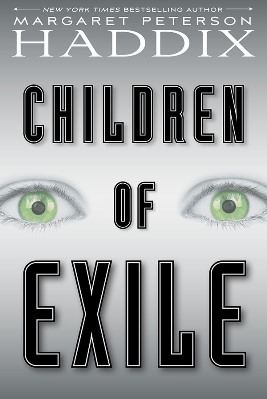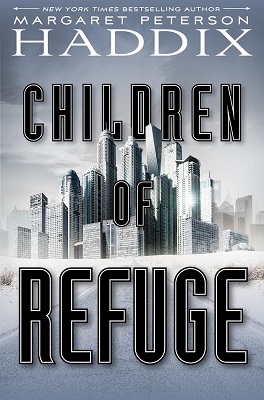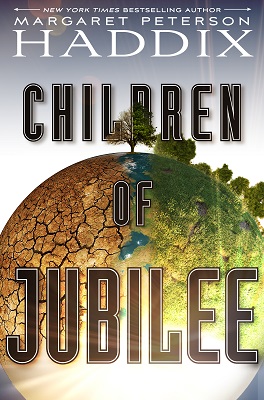Children of Exile: Discussion Guide
A Curriculum Guide to
Children of Exile By Margaret Peterson Haddix
About the Book
Fredtown was a happy, safe place to grow up. But now that Rosi, one of the oldest of the town’s children, is twelve, she and all the other children must suddenly leave without their Fred-parents. “You’re going home,” they’re told. But when they arrive home after a long plane ride, they find a harsh world full of angry adults—and no other children or teens. Rosi tries to protect her younger brother and the other children, but her belief in the importance of kindness lands her in prison. With secrets and violence all around her, what can Rosi do to save herself and the others?
Discussion Questions
Setting The discussion questions below particularly address the following English Language Arts Common Core State Standards: (RL.5-8.1).
1. Describe Fredtown, including its physical layout and places that Rosi visits or mentions. How does she feel when she’s there? Why does she call it a “simple place”?
2. Give some details about the new home that Rosi and Bobo are sent to, and the town around it. Compare and contrast it to Fredtown. What are Rosi’s emotional reactions to the new place?
3. When do you think the story takes place in terms of time: past, present, or future? Or does the setting have nothing to do with Earth and its history or future? What evidence in the text are you basing your answer on?
4. Near the story’s end, Rosi starts to learn about the social structure that has governed her life, which includes the group called the Enforcers. Who are they and how do they act? What is their relationship to the Freds and to her new town? What does she learn about the intergalactic court?
Character
The discussion questions below particularly address the following English Language Arts Common Core State Standards: (RL.5-8.1, 3).
1. What kind of person is Rosi? List some adjectives that express her character. What aspects of her upbringing have influenced her behavior and values?
2. Describe Rosi’s relationship with Bobo and how it is important in the plot. What is he like? How does she feel about him?
3. In the past, Rosi and Edwy were friends. What did they have in common? What changed their friendship before the story opened? How does it change again once they are sent to the new town?
4. Why did Edwy start to mistrust the Freds while he was still in Fredtown? How did he start to behave toward them? Discuss Edwy’s personality and how he is different from Rosi.
5. Rosi’s new parents have had difficult pasts. Describe her first reactions to them and what she later understands about their behavior. Why are they so harsh? Why are they different when she returns from the prison?
Plot
The discussion questions below particularly address the following English Language Arts Common Core State Standards: (RL.5–6.5) (RL.5-8.1, 6)
1. Discuss the first line of the novel, including the reasons Rosi considered herself an orphan and what changed her mind. Why do you think the author opened the book with this line?
2. Explain the importance of eye color and other physical features in the new town. What is the history around eye color? How does learning more about it affect Rosi’s view of her new parents?
3. What does the incident in the church reveal to Rosi about her new town? How does the missionary react to her at church, and how does he help her later? Talk about religion in the story, what Rosi learned from the Freds, and what role religion plays in her new town.
4. Describe some of the challenges that Rosi faces, including physical dangers, and how she deals with them. How does she help Bobo and other children? How does Edwy help her?
5. Why doesn’t Rosi go with Mrs. Osemwe in the end? How does her choice reflect her personality and values? Discuss whether you think she made the right choice for herself and the other two children.
6. How does the author keep the reader in suspense throughout the book? How does having Rosi as the narrator contribute to the suspense and uncertainty? Identify some cliffhangers at the end of chapters and discuss their effect on the reader.
Theme
The discussion questions below particularly address the following English Language Arts Common Core State Standards: (RL.5-8.2).
1. What secrets do the Fred-parents keep from the children, and why? What secrets do the new parents keep, and why? Does Rosi keep secrets from Bobo? Discuss when secrecy might be acceptable, especially in relation to children. Do you think the two sets of parents made the right decisions? Why or why not?
2. Why does Rosi have more responsibility than the other children? What do the Fred-parents and the new parents expect of her? How does she feel about those expectations? Discuss whether you think the parents are justified in asking so much of Rosi.
3. Discuss the role of peace, nonviolence, and violence in the story. Why did the Freds take their name from a word for peace? What did they teach Rosi about nonviolence? How is violence part of her new world, and what is her reaction to it?
Language
The discussion questions below particularly address the following English Language Arts Common Core State Standards: (RL.5-8.4).
1. What is the meaning of the word exile, and what are your associations with the word, if any? Talk about the title and why the author chose it. What are possible meanings of the title in relationship to the story?
2. After Bobo refers to his biological father as “the father,” Rosi adopts the term along with “the mother.” Why does she use those phrases instead of “my mother and father”? When does she change her mind, and why?
Extension Activities
Fredtown versus Home
Have students make simple charts to compare Fredtown and the new town where the children end up. Students can choose categories such as food, safety, buildings, the marketplace, and so on. They should then use phrases or full sentences to describe that aspect of each town. Have them share their charts in small groups.
Notable for Their Nonviolence
The missionary describes three leaders that Rosi names as “notable for their nonviolence.” They are Mahatma Gandhi, Martin Luther King Jr., and Nelson Mandela. Have students work in pairs to research one of the men and his importance in history. Each pair should prepare a short report and share it in small groups with students who researched the other leaders.
Powerful Principles
Throughout the novel, Rosi refers to quotations she learned from the Freds (pp. 11, 67, 91, 102, and 293 in the hardcover edition of this book). Have students choose one of the quotations and try to find its source through an Internet search. Then have the students each write an essay about their quotation, what it means, and why the Fred-parents taught it to the children.
The Intergalactic Court
Mrs. Osemwe tells Rosie about the intergalactic court and its decisions. Divide students into two groups. Those in one group will prepare arguments about why the children should have stayed in Fredtown or be returned there. The other group will defend moving the children to their original homes. Hold debates where students argue opposing sides in front of small groups who take on the role of the court and make a decision.
What Next? At the end, Rosi expects to see Edwy again and maybe rescue him. Have pairs of students brainstorm about what might happen to Rosi and Edwy next, and then write a conversation between them when they meet again. The conversation should reflect the experiences and the characters’ emotions. Have each pair perform their conversation for the class, and then discuss the differences among the dialogues.
Guide written by Kathleen Odean, a former school librarian and Chair of the 2002 Newbery Award Committee. She gives professional development workshops on books for young people and is the author of Great Books for Girls and Great Books about Things Kids Love.
This guide, written in alignment with the Common Core Standards (www.corestandards.org) has been provided by Simon & Schuster for classroom, library, and reading group use. It may be reproduced in its entirety or excerpted for these purposes.





Connect with Margaret: